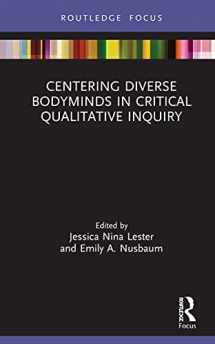
Centering Diverse Bodyminds in Critical Qualitative Inquiry (Developing Traditions in Qualitative Inquiry)
Book details
Summary
Description
Awarded the 2022 American Educational Studies Association Critics' Choice Book Award.
Centering Diverse Bodyminds in Critical Qualitative Inquiry directly responds to the call for engaging in a new critical qualitative inquiry with consideration to issues related to power, privilege, voice, identity, and agency, while examining the hegemonic power of ableism and ableist epistemologies.
The contributing authors of this edited volume advance qualitative methods and methodological discussions to a place where disability embodiment and the lived experience of disability are potential sources of method and methodological advancement. Accordingly, this book centers disability, and, in so doing, examines methodological challenges related to normative and ableist assumptions of doing qualitative research. The range of chapters included highlights how there is no singular answer to questions about qualitative method and methodology; rather, the centering of diverse bodyminds complicates the normative desire to create method/methodology that is “standard,” versus thinking about method and methodology as fluid, emerging, and disruptive.
As an interdisciplinary text on critical qualitative research and disability studies with an international appeal, Centering Diverse Bodyminds in Critical Qualitative Inquiry is valuable for graduate level students and academics within a broad range of fields including critical qualitative research methodologies and methods, disability studies, cultural studies, discourse studies, education, sociology, and psychology. Disciplines that engage in the teaching of qualitative research methodologies and methods, particularly those that foreground critical qualitative research perspectives, will also find the book appealing.


We would LOVE it if you could help us and other readers by reviewing the book
Book review



